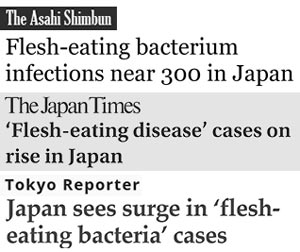
Surge in deadly ‘flesh-eating’ disease in Japan — “Shatters annual record” — Health experts issue advisories — Official: “Researchers are not sure why… There is so much we still don’t know” — Number of cases began rising in 2011 (VIDEO)
ENE News

The majority of patients are aged over 60 but younger people, including children, also contracted the disease, the NIID official said… The Tokyo Metropolitan Infectious Disease Surveillance Center urges people with swelling wounds and pain, as well as fever, to seek medical attention.
Asahi Shimbun, Aug 26, 2015: Flesh-eating bacterium infections near 300 in Japan — A deadly flesh-eating bacterium has infected 284 people as of Aug. 16, already shattering Japan’s annual record and prompting advisories from health experts, according to the National Institute of Infectious Diseases. The patients with streptococcal toxic shock syndrome (STSS) include 45 people in Tokyo…
Tokyo Reporter, Aug 24, 2015: Japan sees surge in ‘flesh-eating bacteria’ cases… In Japan, where the number of STSS cases recorded annually is usually around 100, data released last week by the National Institute of Infectious Diseases raised some eyebrows… [A Ministry of Health, Labour and Welfare] official tells TV Asahi (Aug. 18): “From now, we will be monitoring any sign of an outbreak closely.”
Infectious Agents Surveillance Report, Aug 2015: Streptococcal Infections in Japan, 2012-2015, as of June 2015 — Group A Streptococcus (GAS)… causes acute pharyngitis and other acute suppurative infections, such as cellulitis; scarlet fever and streptococcal toxic shock syndrome (STSS) by bacterial toxin; and rheumatic fever… In 2014-2015, the number of patients began to increase from the end of 2014 and by week 24 of 2015, the weekly report per sentinel attained the highest level (3.64) in the past 10 years… The number of STSS [streptococcal toxic shock syndrome] cases has been increasing since 2011; 241, 201, and 270 cases were reported in respective years from 2012 to 2014… In 2015, number of reported cases reached 204 within the first 24 weeks… During 2012-2014, STSS was reported from all 47 prefectures in Japan… Recently, GBS [Group B Streptococcus] with reduced penicillin susceptibility (PRGBS) has emerged… Additional comments: The reported number of GAS pharyngitis and STSS cases has been increasing in recent years… Pediatric sentinel-based monitoring of GAS cases and notification of all STSS cases should be further strengthened… The pathogen surveillance data should be promptly fed back to clinicians so that the information can be used for understanding of ongoing streptococcal epidemics and for early diagnosis and therapy.
US Dept. of Defense, 2012: [C]oncerns about nuclear disasters have… shifted to emphasize the low-dose acute and low-dose–rate chronic irradiation scenarios… nonlethal doses of ionizing radiation enhance susceptibility to exogenous bacterial infections… The predominant bacteria isolated from wounds included… b-hemolytic [and] a-hemolytic Streptococcus…
Al Jazeera: What does Polonium do to a person?… An amount equivalent to the size of a particle of dust is lethal. After being taken into the body… it bombards people’s cells with millions of radioactive alpha particles [and] damages the intestines, causing toxic shock syndrome.
Dr. Nick Priest, toxicology professor at Middlesex Univ.: If polonium is ingested [it] will travel through the gut… Destruction of the inner gut wall will lead to… toxic shock syndrome.
Published: No |
